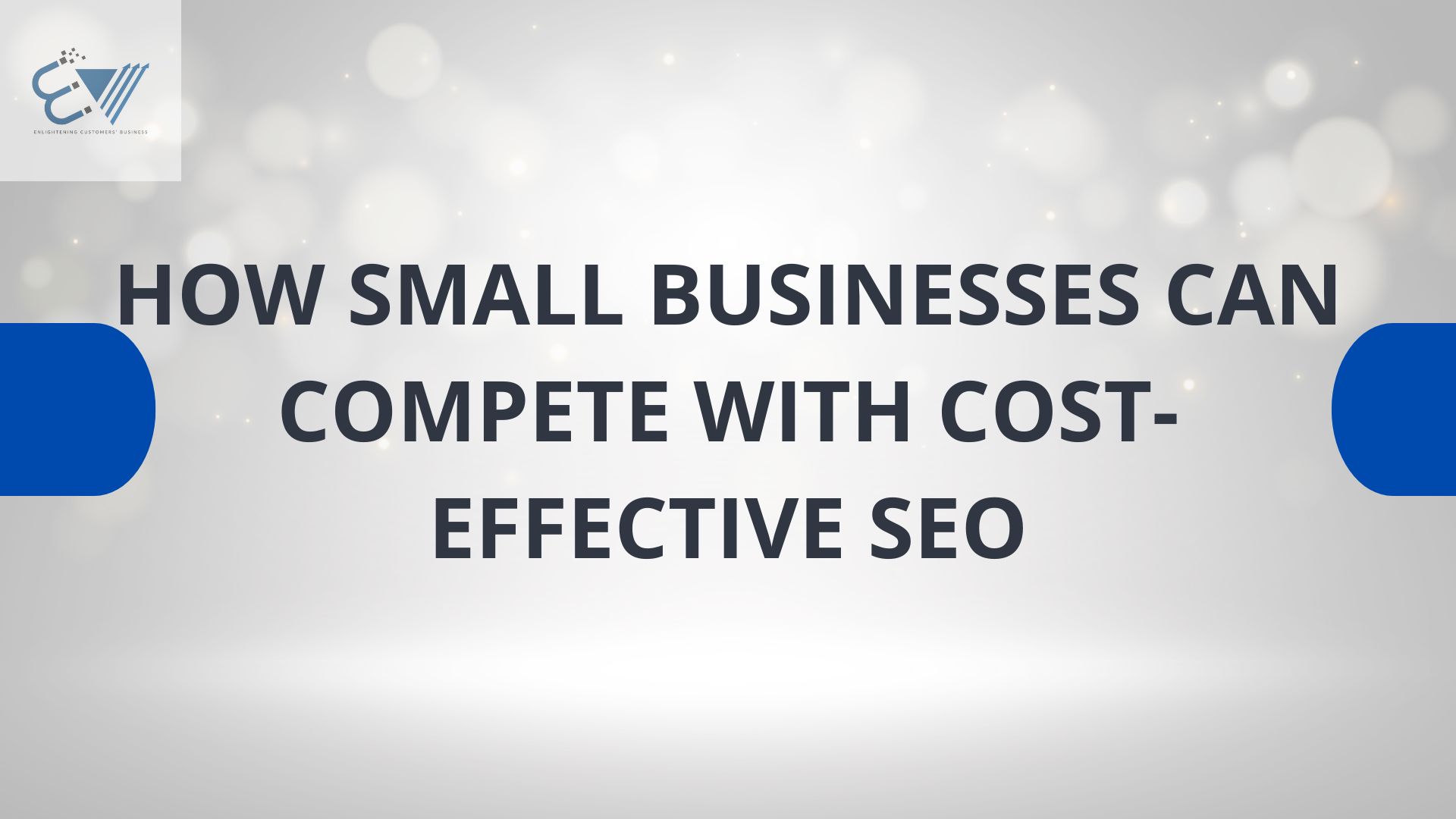Every small business dreams of being discovered. Yet, in today’s digital-first world, discovery isn’t accidental—it’s engineered. The marketplace no longer begins at the storefront; it begins on search engines, where potential customers decide within seconds which business earns their trust and their clicks. For small businesses running on tight budgets, the question is simple but pressing: How do you compete online without outspending everyone else?
That’s where cost-effective SEO comes in. Search engine optimization doesn’t have to drain your budget to deliver results. What it does require is focus, consistency, and a willingness to adapt smarter tactics rather than just bigger ones. This blog will unpack what cost-effective SEO really means, why it’s tailor-made for small businesses, the hurdles most face, and the strategies that allow local entrepreneurs to win digital ground without overspending.
Understanding Cost-Effective SEO
What Does Cost-Effective SEO Mean?
Cost-effective SEO is not about being cheap—it’s about being strategic. It’s the practice of maximizing results while minimizing wasted spend. Instead of pouring money into broad campaigns that compete with global corporations, cost-effective SEO sharpens focus: targeting the right audience, using the right keywords, and applying tactics that provide long-term growth rather than fleeting gains.
Think of it as compound interest. The small, consistent steps—optimizing your site, building citations, publishing localized content—stack over time to generate results far more valuable than one-off paid ads.
Why It’s Perfect for Small Businesses
Small businesses thrive on efficiency. Unlike corporate giants, they can pivot quickly, adopt new tools without bureaucracy, and engage their communities authentically. SEO amplifies those strengths. A bakery doesn’t need to dominate global search; it just needs to show up when someone in town types “fresh bread near me.” Cost-effective SEO ensures that happens, without requiring the budget of a Fortune 500 company.
For small businesses, it’s the ultimate equalizer—proof that visibility isn’t only bought, it’s earned.
Challenges Small Businesses Face in SEO
If cost-effective SEO is such a powerful tool, why doesn’t every small business succeed with it? The truth is, the challenges are real and often underestimated:
- Budget constraints – Owners hesitate to invest in SEO because they assume it requires thousands of dollars upfront.
- Time limitations – Running daily operations leaves little bandwidth to learn and execute digital strategies.
- Technical complexity – From understanding algorithms to implementing structured data, SEO can feel like an overwhelming technical jungle.
- Competition – Even locally, businesses often compete for the same handful of search terms, making persistence essential.
- Inconsistent execution – Many small businesses dabble in SEO sporadically, abandoning efforts when results aren’t immediate.
These hurdles are real—but not insurmountable. The difference lies in strategy.
Strategies for Cost-Effective SEO
Small businesses don’t need to reinvent the wheel. They need to prioritize tactics that provide maximum return at minimal cost. Here’s where to start:
1. Focus on Local SEO
Local SEO is the single most impactful approach for small businesses. Claim and optimize your Google Business Profile, keep business information consistent across directories, and target location-based keywords. Being visible in “near me” searches captures customers who are ready to act right now.
2. Optimize On-Page SEO
On-page SEO is often overlooked but incredibly cost-efficient. Ensure your website has:
- Clear title tags and meta descriptions with relevant keywords.
- Optimized headers that make content scannable.
- Internal linking that guides users (and search engines) through your site.
- Fast loading speed and mobile-friendly design.
Small tweaks can mean big ranking improvements.
3. Create Quality Content Consistently
Consistency wins in SEO. Regularly publish blogs, guides, or FAQs that answer the questions your customers are already searching for. A plumbing service, for instance, might write “5 Quick Fixes Before You Call an Emergency Plumber.” Each piece becomes a new gateway for customers to discover you.
4. Build Strong Backlinks Without Overspending
Backlinks are like digital endorsements. Instead of buying them—which risks penalties—build them organically:
- Collaborate with local bloggers or news outlets.
- Partner with complementary businesses for link exchanges.
- Submit your business to reputable local directories.
Backlinks rooted in relevance and authenticity are worth more than dozens of low-quality links.
5. Leverage Free & Affordable SEO Tools
Free tools like Google Search Console, Google Analytics, and Ubersuggest provide keyword insights, traffic data, and site health checks. Affordable platforms like BrightLocal or SEMrush (basic plans) help track local rankings. The right tools eliminate guesswork.
6. Encourage Customer Reviews and Engagement
Reviews aren’t just testimonials—they’re ranking factors. Ask satisfied customers to share their experiences on Google and Yelp. Respond to every review, positive or negative, to show accountability. Engagement signals to search engines (and real people) that your business is active and trustworthy.
Low-Cost SEO Tactics That Deliver Big Results
SEO doesn’t have to come with a hefty price tag. In fact, some of the most effective tactics require little more than time, creativity, and consistency. Here are strategies that punch above their weight:
1. Blogging with intent
Instead of chasing broad, competitive keywords, target long-tail phrases. A café might write, “Best vegan breakfast in [city],” while a local hardware store could publish “DIY garden hacks for summer in [region].” These micro-targeted posts attract ready-to-buy customers.
2. Answering questions people actually ask
Use tools like AnswerThePublic or Google’s “People Also Ask” box to identify what your audience is searching for. Then create content that directly answers those questions. Search engines favor businesses that provide clear, authoritative answers.
3. Repurposing existing content
Take a blog post and turn it into a short video, an infographic, or a LinkedIn carousel. Repurposing expands your reach without extra cost.
4. Earning backlinks through relationships
Reach out to local media, collaborate with other small businesses, or sponsor community events. Each mention can translate into a backlink—an invaluable signal for SEO.
5. Optimizing images
Renaming photos with descriptive keywords (“houston-plumber-repair.jpg” instead of “IMG1234.jpg”) and compressing them for faster load times can give your site a quick visibility boost.
These tactics aren’t glamorous, but they compound over time and deliver meaningful results for businesses that stick with them.
Tracking SEO Success on a Budget
The beauty of SEO is that success is measurable, even without expensive software. Small businesses can track progress using free or affordable tools:
- Google Analytics (GA4) – Provides insight into traffic sources, bounce rates, and conversions. It helps you understand whether your SEO is turning visitors into customers.
- Google Search Console – Shows which keywords bring people to your site, how often your pages appear in search results, and where you rank.
- Google Business Profile Insights – Monitors calls, clicks, and direction requests directly from your listing.
- Affordable Rank Trackers – Tools like Ubersuggest, SERPWatcher, or BrightLocal let you monitor your keyword positions by location.
- Review growth – A steady increase in reviews across platforms is often a proxy for rising visibility.
Tracking success isn’t about obsessing over vanity metrics—it’s about identifying which efforts drive customers and doubling down on them.
When to Hire a Cost-Effective SEO Expert
DIY SEO works well for startups and very small businesses, but there comes a point where professional help isn’t just useful—it’s necessary. Here’s when to consider bringing in an expert:
- Time becomes your biggest bottleneck – If running SEO means neglecting operations or customer service, outsourcing saves more than it costs.
- Competition intensifies – In industries like law, healthcare, or real estate, you may need professional expertise to outmaneuver well-funded competitors.
- Technical barriers appear – Issues like duplicate content, schema markup, or site architecture are best handled by those with technical training.
- Results plateau – If your rankings flatline despite consistent efforts, a fresh perspective can uncover blind spots.
Hiring doesn’t have to blow your budget. Many freelancers and boutique agencies offer affordable, flexible packages. The key is to focus on value delivered, not just price quoted.
Building a Sustainable SEO Strategy
Quick wins are tempting, but SEO is a long game. To truly compete, small businesses must think sustainability:
- Commit to consistency – Sporadic bursts of effort won’t work. Publishing, updating listings, and collecting reviews should be ongoing habits.
- Prioritize user experience – Fast-loading pages, intuitive navigation, and mobile responsiveness are as critical as keyword placement. Search engines reward businesses that make life easier for users.
- Invest in evergreen content – Articles like “How to Maintain Your Roof in [city]” or “Top 5 Winter Landscaping Tips” can drive traffic for years with only periodic updates.
- Stay adaptable – Algorithms change. What worked in 2022 may not work today. Keeping up with trends ensures your strategy evolves instead of stagnates.
The ultimate goal is to build an SEO foundation so strong that even if you pause paid campaigns, your visibility continues to grow.
Conclusion
Cost-effective SEO is the bridge between ambition and affordability for small businesses. You don’t need the budget of a global brand to compete—you need sharp strategies, consistent execution, and the discipline to focus on what truly drives results. By leaning on low-cost tactics, tracking progress with free tools, and knowing when to call in expert help, small businesses can build visibility that translates directly into customers.
But remember—SEO isn’t a sprint. It’s a compounding investment where small, steady steps create lasting momentum. Done right, it not only boosts rankings but strengthens credibility, trust, and long-term growth. Partnering with an affordable local SEO agency can accelerate that process while keeping costs manageable.
FAQs
1. What is the cheapest way to improve local visibility?
The quickest and most cost-effective step is to optimize your Google Business Profile. Complete every field, upload photos, post updates, and collect reviews—it’s free but immensely powerful.
2. How important are online reviews for small businesses?
They’re critical. Reviews act as modern-day referrals, influencing both customer decisions and Google’s algorithm. A steady stream of positive reviews signals trustworthiness and boosts rankings.
3. Do I need a website to boost local reach?
Not initially. An optimized Google Business Profile and consistent directory listings can drive visibility. However, having a website strengthens credibility, provides more ranking opportunities, and supports long-term SEO growth.



